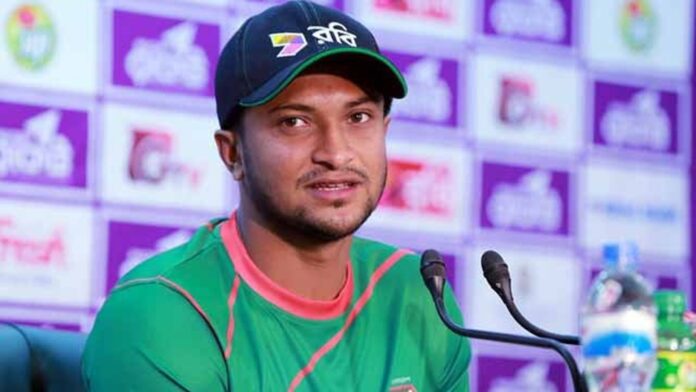Cricket, often called as the “gentleman’s game,” is renowned for its sportsmanship, rules, and adherence to fair play. However, during the World Cup 2023 match in Delhi, a controversial incident involving Bangladesh’s captain, Shakib Al Hasan, brought the concept of “timed out” into the spotlight. It sparked discussions about the interpretation of the rules, the spirit of cricket, and a captain’s unwavering decision-making.
As per Rule 40.1.1 of the ICC’s playing conditions, a batter must be prepared to receive the next ball within two minutes of a dismissal or retirement. If this requirement is not met, the incoming batter can be declared “timed out.” This rule exists to maintain the flow and pace of the game.
The controversy emerged during the 25th over of the Sri Lankan innings when Angelo Mathews faced an unexpected situation. His helmet strap broke, prompting him to call for a replacement helmet. As he awaited the new headgear, more than three minutes passed since the previous dismissal.
Shakib Al Hasan, known for his competitive spirit, seized the moment to appeal for “timed out” against Angelo Mathews. The on-field umpires, Marais Erasmus and Richard Illingworth, both experienced ICC Elite Panel match officials, engaged Shakib in a dialogue. They asked him twice if he would consider withdrawing the appeal.
To the surprise of many, Shakib did not change his decision. This unyielding stance led to Angelo Mathews becoming the first cricketer in the history of international cricket to be given a “timed out” dismissal. In the aftermath of this decision, discussions about sportsmanship and adherence to the laws of the game emerged.
Shakib defended his decision, emphasizing that he was merely playing within the framework of the game’s laws. When questioned about the appeal, he explained that if he had declared Mathews “out,” he had a responsibility to stand by that decision.
In response to concerns raised about the spirit of cricket, Shakib suggested that if anyone had an issue with the rule, they should approach the ICC to advocate for a change. This statement underscores the importance of continuously evaluating and evolving the rules of the game.
“I appealed to the umpires, umpire told me whether you’re going to call him back or not, if I said he’s out, then you call him back, it doesn’t look good. I said I won’t call him back,” Shakib said in the post-match press conference after Bangladesh won the heated match by three wickets.
Shakib’s final stance was rooted in his commitment to his team’s success. He stressed that he had to make the decision that would best contribute to his team’s victory, regardless of the controversy it generated.
‘I Am Never Going To Be As Good As Him’, Virat Kohli Outstanding Statement After Equalling Sachin’s 49th Hundred Record
He added, “Well, then ICC should look into it and change the rules. It’s in the laws. I don’t know if it’s right or wrong, but I had to take a decision to, you know, make sure that my team wins, and whatever I had to do, I have to do it”.
In a contrasting perspective, Angelo Mathews disagreed with the decision, challenging the interpretation of the timed-out rule. He claimed that visual evidence supported his claim that he still had five seconds on the clock when he was at the crease.
Mathews raised an essential point about player safety. He questioned whether it was sensible for a batter to take their guard without a helmet, highlighting the paramount importance of player well-being.
“Yeah, because I haven’t done anything wrong. I had two minutes to get to the crease and get myself ready, which I did. And then it was an equipment malfunction…We have the video evidence from the time the catch was taken, and then from the time I walked into the crease, I still had five seconds after breaking my helmet. So, we talk about the safety of the players – you guys tell me if It’s right for me to take my guard without my helmet on? It’s just pure common sense,” he said.
As the controversy continued, it was essential not to overshadow the cricketing action on the field. Bangladesh managed to chase down Sri Lanka’s target of 280 runs with 8.5 overs and 7 wickets to spare. The match itself displayed the competitive spirit of both teams and highlighted the unpredictability of the game.






















